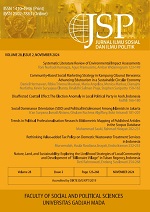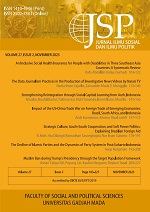Unlocking Women’s Empowerment towards Digital Inclusivity in East Kalimantan through Digital Competence Evaluation
Rina Juwita(1), Diah Rahayu(2), Ainun Nimatu Rohmah(3*), Resky Dhemas Pawae(4)
(1) Communication Science Program, Faculty of Social and Political Science, Universitas Mulawarman, Indonesia.
(2) Psychology Study Program, Universitas Mulawarman, Indonesia.
(3) Communication Science Program, Faculty of Social and Political Science, Universitas Mulawarman, Indonesia
(4) Communication Science Program, Faculty of Social and Political Science, Universitas Mulawarman, Indonesia
(*) Corresponding Author
Abstract
The ability to use different Internet-mediated forms is a basic competence in the digital era, which indicates that women, too, need to have adequate digital skills for daily activities. However, previous studies found that women have a lower digital literacy index than men due to their sociocultural role and expectations and less motivation to engage with technology among older individuals. Digital competence is essential to enhance digital inclusivity, especially for women in East Kalimantan Province, following the future challenges of the Capital City of Nusantara (IKN) development and Indonesia Digital Vision 2045. This study employed a quantitative approach, which entailed adapting seven dimensions of digital competence from the DigComp 2.0 model as research instruments: basic knowledge of hardware and software, information and data literacy, communication and collaboration, digital content creation, security, problem-solving, and career-related competencies. This study involved a sample size of 538 women. The findings offer theoretical insights into the employment of the DigComp 2.0 model within a specific context and recommendations for women’s empowerment strategies. The result showed that women’s digital competence level in East Kalimantan was high, except for the content creation and problem- solving. Another intriguing finding is that the level of education was not directly related to the level of digital competence, which contradicts previous studies. Future studies could employ the same instrument to corroborate the findings in this study across diverse sociocultural contexts in Indonesia. Another direction is to consider psychological variables that could influence digital competence.
Keywords
Full Text:
PDFReferences
Alarcón, R., del Pilar Jiménez, E., & de Vicente-Yagüe, M. I. (2020). Development and validation of the DIGIGLO, a tool for assessing the digital competence of educators. British Journal of Educational Technology, 51(6), 2407–2421. https://doi. org/10.1111/bjet.12919
Ameliah, R., Negara, R. A., & Rahmawati, I. (2022). Status Literasi Digital di Indonesia 2021 (p. 60). Katadata Insight Center; Kominfo. https://cdn1.katadata.co.id/ media/microsites/litdik/Status_Literasi_ Digital_diIndonesia%20_2021_190122.pdf
Anirwan, A., Aljurida, A. M. A., & Baharuddin, T. (2024). Developing a New Capital City (IKN) In Indonesia: A Thematic Analysis. Policy & Governance Review, 8(1), 1. https:// doi.org/10.30589/pgr.v8i1.863
Anjarwati, S., & MLIS, M. (2022, October 11). Protecting Safety and Privacy on Social Media Through Digital Literacy Competence: A Study of Library and Information Science Students UIN Sunan Kalijaga Yogyakarta. Building World Peace Through Cultural Studies. A-ICONICS (Adab-International Conference on Information and Cultural Sciences), Yogyakarta.
APJII. (2022). Profil Internet Indonesia 2022 (Indonesian Internet Profile 2022). APJII. https://apjii.or.id/dow nl oad_ surv ei/2feb5ef7-3f51-487d-86dc- 6b7abec2b171
Ariansyah, K., Anandhita, V. H., & Sari, D. (2020). Investigating the Next Level Digital Divide in Indonesia. 4th Technology Innovation Management and Engineering Science International Conference (TIMES- ICON). https://doi.org/10.1109/TIMES- iCON47539.2019.9024668
Ariyanti, N. M. P., Yulianto, V. I., Ardhana, I. K., & Puspitasari, N. W. R. N. (2022). Anxiety of North Penajam Paser’s Society towards the Capital City Relocation in Indonesia: Psychological Analysis. Resmilitaris, 12(4),535–548.
Azwar, S. (2017). Penyusunan Skala Psikologi (2nd Edition). Pustaka Pelajar.
Bashir, S., & Miyamoto, K. (2020). Digital Skills: Frameworks and Programs [Other Education Study]. World Bank. https://openknowledge. worldbank.org/handle/10986/35080
Bhardwaj, P. (2019). T ypes of s am pling in research. Journal of the Practice of Cardiovascular Sciences, 5(3), 157. https:// doi.org/10.4103/jpcs.jpcs_62_19
Brata, W. W. W., Padang, R. Y., Suriani, C., Prasetya, E., & Pratiwi, N. (2022). Student’s Digital Literacy Based on Students’ Interest in Digital Technology, Internet Costs, Gender, and Learning Outcomes. International Journal of Emerging Technologies in Learning (iJET), 17(03), 138–151. https:// doi.org/10.3991/ijet.v17i03.27151
Candrasari, Y., Permata, S., Rachmania, A., & Claretta, D. (2020). YOUNG WOMEN DIGITAL COMPETENCE IN USING THE INTERNET IN SURABAYA. Profetik: Jurnal Komunikasi, 13(2), 310. https://doi. org/10.14421/pjk.v13i2.1875
Fatmawati, N. I., & Sholikin, A. (2019). Literasi Digital, Mendidik Anak di Era Digital Bagi Orang Tua Milenial. MADANI: Jurnal Politik Dan Sosial Kemasyarakatan, 11(2), 119–138. https://doi.org/10.52166/madani.v11i2.3267
Fauzi, F., Antoni, D., & Suwarni, E. (2020). Women entrepreneurship in the developing country: The effects of financial and digital literacy on SMEs’ growth. Journal of Governance and Regulation, 9(4), 106–115. https://doi.org/10.22495/jgrv9i4art9
Ferrari, A., Punnie, Y., & Redecker, C. (2012). Understanding Digital Competence in 21st Century: An Analysis of Current Frameworks. Eur. Conf. Technol. Enhanc. Learn, 7653, 79–92.
Gurumurthy, A., & Chami, N. (2017). A feminist action framework on development and digital technologies. Association for Progressive Communication. https://redi.anii.org.uy/jspui/bitstream/20.500.12381/330/1/Feminist Action Framework On Development And Digital Technologies.pdf
Hassan, N. (2021). Improving Digital Literacy among women can help enhance health care in the nation. UNDP Indonesia. https://www.id.undp.org/content/indonesia/en/home/ presscenter/articles/2021/Wider-access-on-digital-literacy.html
Iliyasu, R., & Etikan, I. (2021). Comparison of quota sampling and stratified random sampling. Biometrics & Biostatistics International Journal, 10(1), 24–27. https:// doi.org/10.15406/bbij.2021.10.00326
Iordache, C., Mariën, I., & Baelden, D. (2017). Developing digital skills and competences: A quick-scan analysis of 13 digital literacy models. Italian Journal of Sociology of Education, 9(1), 6–30. http://dx.doi.org/10.14658/pupj-ijse-2017-1-2
Jahriyah, V. F., Qonitatazzakiyah, K., Sakiya, D., & Huroiroh, E. (2022, June 1). PARTISIPASI PEREMPUAN DALAM PEMBANGUNAN IKN. Konferensi Nasional Sosiologi IX APSSI, Balikpapan.
Jellema, A., & Brudvig, I. (2015). Women’s Rights Online: Translating Access into Empowerment (p. 52) [Global Report]. World Wide Web Foundation; Swedish International Development Cooperation Agency (Sida). https://webf2.wpenginepowered.com/ wp-content/uploads/2015/10/womens- rights-online21102015.pdf
Kemkhadze, S. (2021). Where are the women in the digital age? Www.Thejakartapost. Com. https://www.thejakartapost.com/ academia/2021/04/21/where-are-the- women-in-the-digital-age.html
Kemp, S. (2021). Digital 2021: The Latest Insights into The ‘State Of Digital’ (Special Report: Digital 2021). We Are Social; Hootsuite. https://wearesocial.com/uk/blog/2021/01/ digital-2021-uk/
Kerras, H., Sánchez-Navarro, J. L., López- Becerra, E. I., & de-Miguel Gómez, M. D. (2020). The impact of the gender digital divide on sustainable development: Comparative analysis between the european union and the maghreb. Sustainability (Switzerland), 12(8), 1–30. https://doi.org/10.3390/SU12083347
Kominfo. (2023). Digital Indonesia Vision 2045. The Ministry of Communication and Inform ation, Republic of Indonesia (Kominfo).
Kusumawardani, E., Tristanti, T., & Kusumawardani, E. (2022). Digital literacy model to empower women using community-based education approach. World Journal on Educational Technology: Current Issues, 14(1), 175–188. https://doi. org/10.18844/wjet.v14i1.6714
Law, N., Woo, D., de la Torre, J., & Wong, G. (2018). A Global Framework of Reference on Digital Literacy Skills for Indicator 4.4.2 (UIS/2018/ICT/IP/51; Information Paper No. 51 June 2018, p. 146). UNESCO Institute for Statistics. https://uis.unesco.org/sites/default/files/documents/ip51-global-framework-reference-digital- literacy-skills-2018-en.pdf
Long, T. Q., Hoang, T. C., & Simkins, B. (2023). Gender gap in digital literacy across generations: Evidence from Indonesia. Finance Research Letters, 58(Part D), 104588. https://doi.org/10.1016/j.frl.2023.104588
Marini, S., Hanum, F., & Sulistiyo, A. (2020). Digital Literacy: Empowering Indonesian Women In Overcoming Digital Divide. Proceedings of the 2nd International Conference on Social Science and Character Educations (ICoSSCE 2019). Proceedings of the 2nd International Conference on Social Science and Character Educations (ICoSSCE 2019), Yogyakarta, Indonesia. https://doi. org/10.2991/assehr.k.200130.029
Mlambo-Ngcuka, P. (2018). Reshaping the future: Women, girls and tech for development. ITUNews. https://news.itu.int/reshaping- future-women-girls-icts/
Moorena, Rabb, M., Rusdinar, A., Schaner, S., Tangoren, C., & Theys, N. (2020). Towards Inclusive Digital Finance in Indonesia: A Literature Review and Landscape Analysis. Inclusive Financial Innovation Initiative (IFII) White Paper, Abdul Latif Jameel Poverty Action Lab, Cambridge, MA. https ://www.povertyactionlab.org/sites/default/files/review-paper/ifii-whitepaper.pdf
Munger, K., Luca, M., Nagler, J., & Tucker, J. (2019). Age Matters: Sampling Strategies for Studying Digital Media Effects. https:// pacscenter.stanford.edu/publication/age-matters-sampling-strategies-for- studying-digital-media-effects/
Nathalia, T. (2017). Women’s Digital Literacy Is Essential: Gov’t Official. Www.Jakartaglobe. Id. https://jakartaglobe.id/news/womens- digital-literacy-essential-govt-official/
OECD. (2014). Assessing problem-solving skills in PISA 2012. PISA 2012 Results: Creative Problem Solving (Volume V): Students’ Skills in Tackling Real-Life Problems.
Piaget, J., & Campell, R. L. (2014). Studies in Reflecting Abstraction (1st Edition). Psychology Press.
Putri, N. H. (2022). Kaltim Peringkat Ketiga Indeks Literasi Digital Tahun 2021. Https://Diskominfo.Kaltimprov.Go.Id/.https://diskominfo.kaltimprov.go.id/pemerintahan/kaltim-peringkat-ketiga- indeks-literasi-digital-tahun-2021
Putri, R. E., Suparti, S., & Rahmawati, R. (2014). Perbandingan metode klasifikasi naïve bayes dan k-nearest neighbor pada analisis data status kerja di Kabupaten Demak Tahun 2012. Jurnal Gaussian, 3(4), 831–838. https://doi.org/10.14710/j. gauss.3.4.831-838
Rahayu, N. W., & Haningsih, S. (2021). Digital parenting competence of mother as informal educator is not inline with internet access. International Journal of Child-Computer Interaction, 29, 100291. https://doi.org/10.1016/j.ijcci.2021.100291
Rahmawati, R., Rohmah, M., Ulfah, Y., Juwita, R., Noor, M. F., & Arifin, Z. (2023). Becoming a viewer again? Optimizing educational tour at IKN Nusantara to encourage community enthusiasm. Jurnal Perspektif Pembiayaan Dan Pembangunan Daerah, 11(1), 159–174. https://doi.org/10.22437/ppd.v11i2.22753
Rai, A. (2019). Digital Divide: How Do Women in South Asia Respond? International Journal of Digital Literacy and Digital Competence (IJDLDC), 10(1). https://doi.org/10.4018/IJDLDC.2019010101
Rizal, R., Rusdiana, D., Setiawan, W., Siahaan, P., & Rid wan, I. M . (2021). Gender differences in digital literacy among prospective physics teachers. Journal of Physics: Conference Series, 1806(1), 012004. https://doi.org/10.1088/1742-6596/1806/1/012004
Santrock, J. W. (2017). Psikologi Pendidikan: Educational psychology (5th Edition). Salemba Humanika.
Schmidt, H. (2013). Media Literacy Education from Kindergarten to College: A Comparison of How Media Literacy Is Addressed across the Educational System. Journal of Media Literacy Education, 5(1), 295–309. https://doi.org/10.23860/jmle-5-1-3
Siahaan, Y. A., & Gunawan, F. E. (2021). Measuring Level of Information and Communication Technology Literacy of University Students in Indonesia: 2nd Southeast Asian Academic Forum on Sustainable Development (SEA-AFSID 2018), Jogjakarta, Indonesia. https://doi. org/10.2991/aebmr.k.210305.044
Simamora, C. M., & Ningsih, R. (2020). Inklusivitas Ekonomi Digital Di Indonesia: Perspektif Gender dan Penciptaan Lapangan Kerja (Studi Kasus Kampung Marketer). Cendekia Niaga, 4(2), 39–53.
Sitepu, Y. S., & Rajagukguk, M. (2022). Digital Literacy Competence Survey in Medan City. Jurnal ASPIKOM, 7(1), 173. https://doi.org/10.24329/aspikom.v7i1.1067
Suarmini, N. W., Zahrok, S., & Yoga Agustin, D. S. (2018). Peluang Dan Tantangan Peran Perempuan Di Era Revolusi Industri 4.0. IPTEK Journal of Proceedings Series, 5, 48. https://doi.org/10.12962/j23546026. y2018i5.4420
Sujarwo, S., Tristanti, T., & Kusumawardani, E. (2022). Digital Literacy Model to Empower Women Using Community- Based Education Approach. World Journal on Educational Technology: Current Issues, 14(1), 175–188.
Susilo, M. E., Yustitia, S., & Afifi, S. (2020). Intergeneration Comparison of the Spread Pattern of Hoax. Jurnal ASPIKOM, 5(1), 50–62. https://doi.org/10.24329/aspikom. v5i1.533
Suwana, F. & Lily. (2017). Empowering Indonesian women through building digital media literacy. Kasetsart Journal of Social Sciences, 38(3), 212–217. https://doi. org/10.1016/j.kjss.2016.10.004
Tejedor, S., Cervi, L., Pérez-Escoda, A., & Jumbo, F. T. (2020). Digital Literacy and Higher Education during COVID-19 Lockdown: Spain, Italy, and Ecuador. Publications, 8(4), 48. https://doi.org/10.3390/publications8040048
Tisnawati, N. M., Ashar, K., Pratomo, D. S., & Susilo. (2020). Digital Divide and the Livelihood Strategy of Female Informal Sector Workers in Rural Areas. Proceedings of the 23rd Asian Forum of Business Education(AFBE 2019). 23rd Asian Forum of Business Education(AFBE 2019), Tanjung Benoa, Bali, Indonesia. https:// doi.org/10.2991/aebmr.k.200606.039
Tripathi, A., Yadav, S., & Rajan, R. (2019). Naïve Bayes Classification Model for the Student Performance Prediction. 20192 nd International Conference on Intelligent Computing, Instrumentation and Control Technologies (ICICICT), 1548–1553. https://doi.org/10.1109/ICICICT46008.2019.8993237
Tsangaratos, P., & Ilia, I. (2016). Comparison of a logistic regression and Naïve Bayes classifier in landslide susceptibility assessments: The influence of models complexity and training dataset size. CATENA, 145 , 164–179. https://doi.org/10.1016/j.catena.2016.06.004
van Deursen, A., Helsper, E. J., & Eynon, R. (2014). Measuring Digital Skills. From Digital Skills to Tangible Outcomes project report. www.oii.ox.ac.uk/research/projects/?id=112
Vuorikari, R., Punie, Y., Carretero Gomez, S., & Van Den Brande, G. (2016). DigComp 2.0: The digital competence framework for citizens. Publications Office of the European Union. https://data.europa.eu/ doi/10.2791/11517
Wahyuningtyas, N., & Adi, K. R. (2016). Digital Divide Perempuan Indonesia. Sejarah Dan Budaya : Jurnal Sejarah, Budaya, Dan Pengajarannya, 10(1), 80–88. https://doi. org/10.17977/um020v10i12016p080
Woetzel, J., Madgavkar, A., Ellingrud, K., Labaye, E., Devillard, S., Kutcher, E., Manyika, J., Dobbs, R., & Krishnan, M. (2015). How advancing women’s equality can add $12 trillion to global growth. McKinsey Global Institute. https://www.mckinsey. com/featured-insights/employment- and-growth/how-advancing-womens- equality-can-add-12-trillion-to-global- growth
Yanti, M., & Yusnaini. (2018). The Narration of Digital Literacy Movement in Indonesia. Inf. Kaji. Ilmu Komun., 48(2), 243–255.
Zahra, N. (2023). Ringkasan Kebijakan No. 19: Meningkatkan Inklusi dalam Indeks Literasi Digital Nasional Dari Pengukuran hingga Pemberdayaan. Center for Indonesian Policy Studies. https://repository.cips-indonesia.org/media/ publications/565200-meningkatkan- inklusi-dalam-indeks-litera-f5c86e8a.pdf
Article Metrics
Refbacks
- There are currently no refbacks.
Copyright (c) 2024 Jurnal Ilmu Sosial dan Ilmu Politik

This work is licensed under a Creative Commons Attribution-ShareAlike 4.0 International License.























